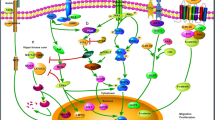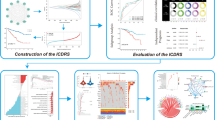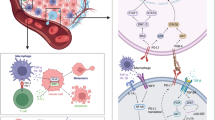Abstract
Purpose
Malignant ascites (MA) is a common manifestation in advanced gastric cancer with peritoneal carcinomatosis and usually indicates a poor prognosis. However, lack of in vitro models that can faithfully recapitulate the characteristics of tumour cells in ascites hinders related researches. Tumour organoids have emerged as a robust in vitro model for tumour research and drug screening. Hence, we aimed to generate a 3-D in vitro organoid cultures from malignant ascites of gastric cancer for disease modelling and drug screening.
Methods
Eleven MADOs were generated from the MA tumour cells of gastric cancer patients. We made comparisons between MADOs and original MA tumour cells in histopathology by immunohistochemistry and genomics by whole-exome sequencing. In order to evaluate MADOs as functional in vitro disease models, we tested whether MADOs could be used for drug sensitivity screens.
Results
Eleven MADO cultures from human gastric cancer were established. MADOs demonstrated divergent growth characteristics and morphologies. MADO cultures preserve the histological architecture, genomic landscape of the corresponding MA tumour cells. MADOs exhibited heterogeneous responses to standard-of-care chemotherapeutics.
Conclusions
We generated MADOs modelling characteristics and mutated genes of MA tumour cells. A broad range of intrinsic MADO response to conventional chemotherapeutics suggests MADOs are amenable to drug screening.




Similar content being viewed by others
Availability of data and materials
The data and materials supporting the conclusions of the current study are available from the corresponding author on reasonable request.
Abbreviations
- CNV:
-
Copy number variation
- GSEA:
-
Gene set enrichment analysis
- HIPEC:
-
Hyperthermic intraperitoneal chemotherapy
- H&E:
-
Haematoxylin and eosin
- ICGC:
-
International cancer genome consortium
- IHC:
-
Immunohistochemistry
- MA:
-
Malignant ascites
- MADO:
-
Malignant-ascites derived organoid
- NCCN:
-
National comprehensive cancer Network
- PBMC:
-
Peripheral blood mononuclear cell
- PCA:
-
Principal component analysis
- PDO:
-
Patient-derived organoid SNV: single-nucleotide variants
- WES:
-
Whole-exome sequencing
References
Ajani JA, D’Amico TA, Almhanna K, Bentrem DJ, Chao J, Das P, Denlinger CS, Fanta P, Farjah F, Fuchs CS et al (2016) Gastric cancer, version 3.2016, NCCN clinical practice guidelines in oncology. J Nat Compr Cancer Netw 14:1286–1312
Barni S, Cabiddu M, Ghilardi M, Petrelli F (2011) A novel perspective for an orphan problem: old and new drugs for the medical management of malignant ascites. Crit Rev Oncol Hematol 79:144–153
Bartfeld S, Bayram T, van de Wetering M, Huch M, Begthel H, Kujala P, Vries R, Peters PJ, Clevers H (2015) In vitro expansion of human gastric epithelial stem cells and their responses to bacterial infection. Gastroenterology 148(126–136):e126
Boeva V, Popova T, Bleakley K, Chiche P, Cappo J, Schleiermacher G, Janoueix-Lerosey I, Delattre O, Barillot E (2012) Control-FREEC: a tool for assessing copy number and allelic content using next-generation sequencing data. Bioinform (Oxf Engl) 28:423–425
Boj SF, Hwang CI, Baker LA, Chio II, Engle DD, Corbo V, Jager M, Ponz-Sarvise M, Tiriac H, Spector MS et al (2015) Organoid models of human and mouse ductal pancreatic cancer. Cell 160:324–338
Broutier L, Mastrogiovanni G, Verstegen MM, Francies HE, Gavarro LM, Bradshaw CR, Allen GE, Arnes-Benito R, Sidorova O, Gaspersz MP et al (2017) Human primary liver cancer-derived organoid cultures for disease modeling and drug screening. Nat Med 23:1424–1435
Cancer Genome Atlas Research, N (2014) Comprehensive molecular characterization of gastric adenocarcinoma. Nature 513:202–209
Cavazzoni E, Bugiantella W, Graziosi L, Franceschini MS, Donini A (2013) Malignant ascites: pathophysiology and treatment. Int J Clin Oncol 18:1–9
Cibulskis K, Lawrence MS, Carter SL, Sivachenko A, Jaffe D, Sougnez C, Gabriel S, Meyerson M, Lander ES, Getz G (2013) Sensitive detection of somatic point mutations in impure and heterogeneous cancer samples. Nat Biotechnol 31:213–219
Cristescu R, Lee J, Nebozhyn M, Kim K-M, Ting JC, Wong SS, Liu J, Yue YG, Wang J, Yu K et al (2015) Molecular analysis of gastric cancer identifies subtypes associated with distinct clinical outcomes. Nat Med 21:449–456
Fang N, Zhang HQ, He B, Xie M, Lu S, Wan YY, Wang NR (2014) Clinicopathological characteristics and prognosis of gastric cancer with malignant ascites. Tumour Biol 35:3261–3268
Fitzmaurice C, Dicker D, Pain A, Hamavid H, Moradi-Lakeh M, Maclntyre MF, Allen C, Hansen G, Woodbrook R, Wolfe C et al (2015) The global burden of cancer 2013 global burden of disease cancer collaboration. JAMA Oncol 1:505–527
Gao D, Vela I, Sboner A, Iaquinta PJ, Karthaus WR, Gopalan A, Dowling C, Wanjala JN, Undvall EA, Arora VK et al (2014) Organoid cultures derived from patients with advanced prostate cancer. Cell 159:176–187
Golan T, Atias D, Barshack I, Avivi C, Goldstein RS, Berger R (2014) Ascites-derived pancreatic ductal adenocarcinoma primary cell cultures as a platform for personalised medicine. Br J Cancer 110:2269–2276
Hill SJ, Decker B, Roberts EA, Horowitz NS, Muto MG, Worley MJ Jr, Feltmate CM, Nucci MR, Swisher EM, Nguyen H et al (2018) Prediction of DNA repair inhibitor response in short-term patient-derived ovarian cancer organoids. Cancer Discov 8:1404–1421
Huang L, Holtzinger A, Jagan I, BeGora M, Lohse I, Ngai N, Nostro C, Wang R, Muthuswamy LB, Crawford HC et al (2015) Ductal pancreatic cancer modeling and drug screening using human pluripotent stem cell- and patient-derived tumor organoids. Nat Med 21:1364–1371
Jehn CF, Kupferling S, Oskay-Ozcelik G, Luftner D (2015) A survey of treatment approaches of malignant ascites in Germany and Austria. Support Care Cancer 23:2073–2078
Jia W, Zhu Z, Zhang T, Fan G, Fan P, Liu Y, Duan Q (2013) Treatment of malignant ascites with a combination of chemotherapy drugs and intraperitoneal perfusion of verapamil. Cancer Chemother Pharmacol 71:1585–1590
Kobayashi M, Ueyama Y, Nakanishi H, Ishida H, Takahashi E, Nakamura S, Koshikawa T, Yatabe Y (2006) Immunocytochemical detection using CDX2: an aid for discerning tumor involvement in ascites cytology. Cancer 108:114–118
Lane D, Goncharenko-Khaider N, Rancourt C, Piche A (2010) Ovarian cancer ascites protects from TRAIL-induced cell death through alpha v beta 5 integrin-mediated focal adhesion kinase and Akt activation. Oncogene 29:3519–3531
Lee SH, Hu W, Matulay JT, Silva MV, Owczarek TB, Kim K, Chua CW, Barlow LJ, Kandoth C, Williams AB et al (2018) Tumor evolution and drug response in patient-derived organoid models of bladder cancer. Cell 173:515–528
Li H, Handsaker B, Wysoker A, Fennell T, Ruan J, Homer N, Marth G, Abecasis G, Durbin R, Genome Project Data Processing S (2009) The sequence alignment/map format and SAMtools. Bioinform (Oxf Engl) 25:2078–2079
Li X, Francies HE, Secrier M, Perner J, Miremadi A, Galeano-Dalmau N, Barendt WJ, Letchford L, Leyden GM, Goffin EK et al (2018) Organoid cultures recapitulate esophageal adenocarcinoma heterogeneity providing a model for clonality studies and precision therapeutics. Nat Commun 9:2983
Maeda H, Kobayashi M, Sakamoto J (2015) Evaluation and treatment of malignant ascites secondary to gastric cancer. World J Gastroenterol 21:10936–10947
Mateescu, C., Becq, A., Bouattour, M., Dreyer, C., Falvre, S.J., and Raymond, E. (2014). Bevacizumab administered intraperitoneally as palliative treatment of malignant refractory ascites. J Clin Oncol 32:1. https://ascopubs.org/doi/10.1200/jco.2014.32.15_suppl.e20617. Accessed 31 January 2017
Mills GB, May C, Hill M, Campbell S, Shaw P, Marks A (1990) Ascitic fluid from human ovarian cancer patients contains growth factors necessary for intraperitoneal growth of human ovarian adenocarcinoma cells. J Clin Investig 86:851–855
Nanki K, Toshimitsu K, Takano A, Fujii M, Shimokawa M, Ohta Y, Matano M, Seino T, Nishikori S, Ishikawa K et al (2018) Divergent routes toward Wnt and R-spondin niche independency during human gastric carcinogenesis. Cell 174:856–869
Ogawa J, Pao GM, Shokhirev MN, Verma IM (2018) Glioblastoma model using human cerebral organoids. Cell Rep 23:1220–1229
Ott MG, Marme F, Moldenhauer G, Lindhofer H, Hennig M, Spannagl R, Essing MM, Linke R, Seimetz D (2012) Humoral response to catumaxomab correlates with clinical outcome: results of the pivotal phase II/III study in patients with malignant ascites. Int J Cancer 130:2195–2203
Puiffe ML, Le Page C, Filali-Mouhim A, Zietarska M, Ouellet V, Tonin PN, Chevrette M, Provencher DM, Mes-Masson AM (2007) Characterization of ovarian cancer ascites on cell invasion, proliferation, spheroid formation, and gene expression in an in vitro model of epithelial ovarian cancer. Neoplasia (NY) 9:820–829
Randle RW, Swett KR, Swords DS, Shen P, Stewart JH, Levine EA, Votanopoulos KI (2014) Efficacy of cytoreductive surgery with hyperthermic intraperitoneal chemotherapy in the management of malignant ascites. Ann Surg Oncol 21:1474–1479
Roerink SF, Sasaki N, Lee-Six H, Young MD, Alexandrov LB, Behjati S, Mitchell TJ, Grossmann S, Lightfoot H, Egan DA et al (2018) Intra-tumour diversification in colorectal cancer at the single-cell level. Nature 556:457–462
Sachs N, de Ligt J, Kopper O, Gogola E, Bounova G, Weeber F, Balgobind AV, Wind K, Gracanin A, Begthel H et al (2018) A living biobank of breast cancer organoids captures disease heterogeneity. Cell 172:373–386
Saunders CT, Wong WS, Swamy S, Becq J, Murray LJ, Cheetham RK (2012) Strelka: accurate somatic small-variant calling from sequenced tumor-normal sample pairs. Bioinform (Oxf Engl) 28:1811–1817
Schutte M, Risch T, Abdavi-Azar N, Boehnke K, Schumacher D, Keil M, Yildiriman R, Jandrasits C, Borodina T, Amstislavskiy V et al (2017) Molecular dissection of colorectal cancer in pre-clinical models identifies biomarkers predicting sensitivity to EGFR inhibitors. Nat Commun 8:14262
Seidlitz T, Merker SR, Rothe A, Zakrzewski F, von Neubeck C, Grutzmann K, Sommer U, Schweitzer C, Scholch S, Uhlemann H et al (2019) Human gastric cancer modelling using organoids. Gut 68:207–217
Shepherd TG, Thériault BL, Campbell EJ, Nachtigal MW (2007) Primary culture of ovarian surface epithelial cells and ascites-derived ovarian cancer cells from patients. Nat Protoc 1:2643
Tiriac H, Belleau P, Engle DD, Plenker D, Deschenes A, Somerville TDD, Froeling FEM, Burkhart RA, Denroche RE, Jang GH et al (2018) Organoid profiling identifies common responders to chemotherapy in pancreatic cancer. Cancer Discov 8:1112–1129
van de Wetering M, Francies H, Francis J, Bounova G, Iorio F, Pronk A, van Houdt W, van Gorp J, Taylor-Weiner A, Kester L et al (2015) Prospective derivation of a living organoid biobank of colorectal cancer patients. Cell 161:933–945
Vlachogiannis G, Hedayat S, Vatsiou A, Jamin Y, Fernandez-Mateos J, Khan K, Lampis A, Eason K, Huntingford I, Burke R et al (2018) Patient-derived organoids model treatment response of metastatic gastrointestinal cancers. Science 359:920–926
Wang K, Li M, Hakonarson H (2010) ANNOVAR: functional annotation of genetic variants from high-throughput sequencing data. Nucleic Acids Res 38:e164
Wang K, Yuen ST, Xu J, Lee SP, Yan HH, Shi ST, Siu HC, Deng S, Chu KM, Law S et al (2014) Whole-genome sequencing and comprehensive molecular profiling identify new driver mutations in gastric cancer. Nat Genet 46:573–582
Weeber F, Ooft SN, Dijkstra KK, Voest EE (2017) Tumor Organoids as a pre-clinical cancer model for drug discovery. Cell Chem Biol 24:1092–1100
Yan HHN, Siu HC, Law S, Ho SL, Yue SSK, Tsui WY, Chan D, Chan AS, Ma S, Lam KO et al (2018) A Comprehensive human gastric cancer organoid biobank captures tumor subtype heterogeneity and enables therapeutic screening. Cell Stem Cell 23:882–897
Zang ZJ, Cutcutache I, Poon SL, Zhang SL, McPherson JR, Tao J, Rajasegaran V, Heng HL, Deng N, Gan A et al (2012) Exome sequencing of gastric adenocarcinoma identifies recurrent somatic mutations in cell adhesion and chromatin remodeling genes. Nat Genet 44:570–574
Acknowledgements
We thank professor Li Gao for providing assistance in immunohistochemistry staining and Huan Xu, Guanglang Zhu as well as Kaijian Wang for providing help in statistical analysis.
Funding
This work was supported by grants from the National Natural Science Foundation of China (31470826), National Major Scientific and Technological Special Project for “Significant New Drugs Development” (2017ZX09304030) and Scientific Research Program of Shanghai Municipal Science and Technology Commission (19411970700).
Author information
Authors and Affiliations
Contributions
JL: design, collection of samples and data. HX: data analysis and interpretation, manuscript writing. LZ: collection of data, revision of the manuscript. LS and LZ: revision of the manuscript and data analysis. XP, DF, MW and BW: collection of samples and data analysis. YZ: genetic analysis. XZ and GH: conception and design, study supervision, data analysis and revision of the manuscript.
Corresponding authors
Ethics declarations
Conflicts of interest
The authors declare that they have no competing interests.
Ethics approval and consent to participate
This study was approved by the Ethics Committee of Changhai Hospital of Second Military Medical University (CHEC2016-157), and written informed consent was obtained from all patients or their guardians.
Consent for publication
Informed consent was obtained from all participants for publication.
Additional information
Publisher's Note
Springer Nature remains neutral with regard to jurisdictional claims in published maps and institutional affiliations.
Electronic supplementary material
Below is the link to the electronic supplementary material.
Figure S1.
Presentative images of organoids derived from normal gastro and primary gastric cancer. (A) Organoid derived from normal gastric tissue. (B) Organoid derived from gastric cancer (PDF 384 kb)
Figure S2.
Morphological variation of MADOs and CDH gene mutations. (A) H&E staining of 5 MADOs lines. The top row (P6, P7, P10) shows MADOs with a dense structure, while the bottom row (P3, P9) shows MADOs with a loose structure. (B) Mutations of CDH gene family of 6 MADO lines based on WES. All of these CDH family genes were confirmed as a missense mutation (PDF 6154 kb)
Figure S3.
Additional diagram of genomic analysis, Related to Figure 3. (A) Principal component analysis (PCA) of tumour cells from MA (T, cross-shaped), blood (PBMC, triangle), and MADOs (O, circular) based on the principal component analysis. (B) Hierarchical clustering heat-map visualising the genetic distance of 100 gDNA samples from 6 patients. (C) OncoPlot describing entire recurrent mutated cancer-related genes (PDF 439 kb)
Figure S4.
Dose-response curves and half-maximal inhibitory concentrations (IC50) of 9 MADOs to 7 conventional chemotherapy drugs, related to Figure 4. Dose-response curves of MADOs (P1, P2, P3) and gastric cancer organoids (GC1, GC2, GC3, GC4, GC5, GC6) treated with 7 chemical drugs. GC, gastric cancer organoid (PDF 493 kb)
Table S1.
All clinical data were collected from oncologists. The diagnosis was based on imaging, exploratory surgery and biopsy (gastroscope or percutaneous peritoneal biopsy) (PDF 407 kb)
Rights and permissions
About this article
Cite this article
Li, J., Xu, H., Zhang, L. et al. Malignant ascites-derived organoid (MADO) cultures for gastric cancer in vitro modelling and drug screening. J Cancer Res Clin Oncol 145, 2637–2647 (2019). https://doi.org/10.1007/s00432-019-03004-z
Received:
Accepted:
Published:
Issue Date:
DOI: https://doi.org/10.1007/s00432-019-03004-z




